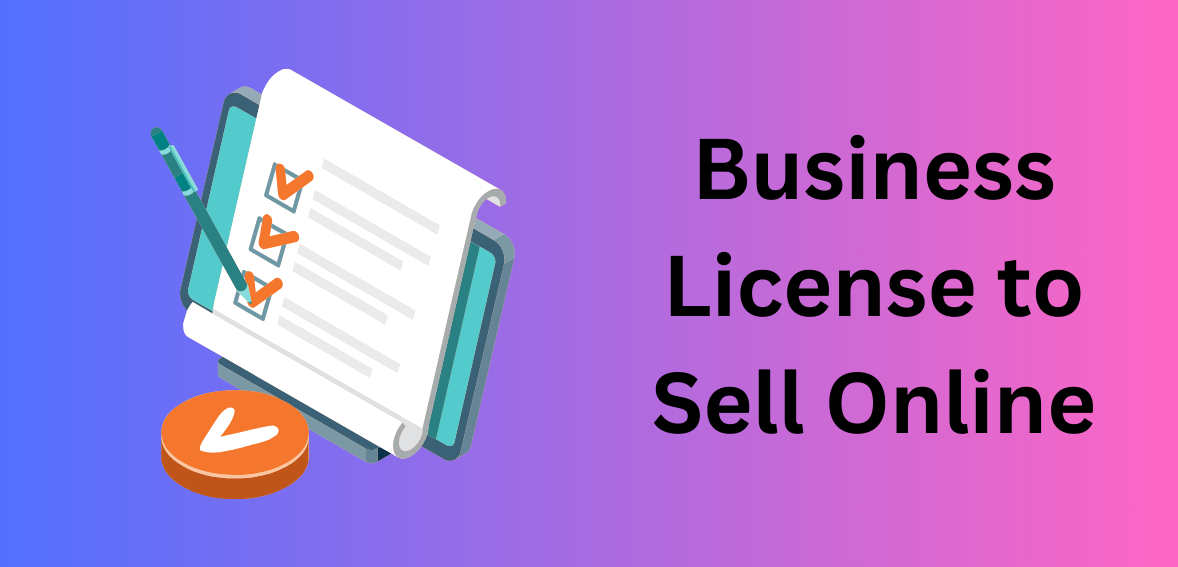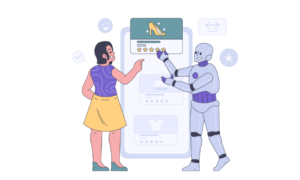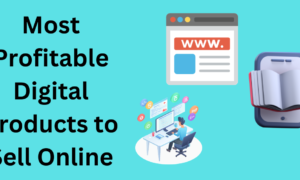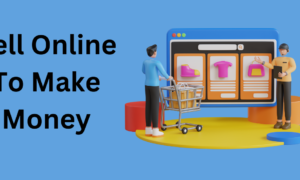Are you considering starting an online business? Whether you’re planning to sell handmade crafts, vintage clothing, or even digital products, there’s one important question you need to address: Do I need a business license to sell online? While it may seem like just another bureaucratic hoop to jump through, obtaining a business license can actually provide numerous benefits and protect your venture in the long run. In this blog post, we’ll explore why having a business license is crucial for online sellers, which types of businesses require a license, how to obtain one, and the potential consequences of selling without proper licensing. So let’s dive in and discover whether getting a business license should be at the top of your priority list as an aspiring e-commerce entrepreneur!
What is a Business License and Why It’s Important
A business license is a legal document that grants permission to an individual or entity to operate a business within a specific jurisdiction. It serves as proof that you have met the necessary requirements and complied with local laws and regulations. Obtaining a business license is not just about fulfilling legal obligations; it also demonstrates your commitment to professionalism and credibility.
One of the primary reasons why having a business license is important for online sellers is that it establishes legitimacy in the eyes of potential customers. When shoppers see that you are operating legally, they are more likely to trust your brand and feel confident in making purchases from your online store. This can lead to increased sales and customer loyalty.
Additionally, having a business license provides protection for both you as the seller and your customers. By obtaining proper licensing, you ensure that any products or services offered meet quality standards and comply with relevant safety regulations. This helps safeguard against potential liability issues should something go wrong.
Moreover, many e-commerce platforms require sellers to provide proof of their business licenses before allowing them to open shop on their platforms. So if you plan on selling through popular channels like Amazon or Etsy, having a valid license will be essential.
Obtaining a business license for selling online goes beyond mere legality – it enhances your reputation, builds trust with customers, offers protection against liabilities, and opens doors to wider marketplaces. Now that we understand its importance let’s explore who specifically needs one as an online seller!
The Benefits of Having a Business License for Online Sellers
Having a business license is an essential aspect of running any online business. While it may seem like an unnecessary hassle, there are several benefits to having a business license as an online seller.
First and foremost, having a business license adds credibility to your online store. It shows potential customers that you are operating legally and professionally. This can help build trust and increase customer confidence in your brand.
Additionally, having a business license allows you to access certain privileges and resources that may not be available to unlicensed sellers. For example, many wholesalers require proof of a valid business license before allowing sellers to purchase products at wholesale prices. This can significantly lower your cost of goods sold and increase your profit margins.
Furthermore, having a business license provides legal protection for both you and your customers. If any disputes or issues arise regarding the products or services you offer, having proper licensing can protect you from personal liability.
Moreover, obtaining a business license also opens up opportunities for tax deductions and benefits. As an official entity recognized by the government, you may be eligible for various tax breaks related to your expenses as an online seller.
Having a business license demonstrates professionalism when dealing with other businesses or industry organizations. It allows you to participate in trade shows, conferences, or networking events that may require proof of licensure.
In conclusion, having a business license is crucial for online sellers due to the numerous benefits it offers – enhanced credibility among customers, accessibility to exclusive resources, legal protection, tax advantages, and increased participation in industry-related activities. By obtaining proper licensing,
online sellers position themselves as legitimate businesses capable of delivering high-quality products
and professional services. So if you’re considering selling online long-term with serious intentions, it’s wise t
Types of Businesses That Require a License to Sell Online
When it comes to selling products or services online, certain types of businesses require a license. These licenses ensure that the business operates legally and follows all necessary regulations. While the specific requirements may vary depending on your location and industry, here are some common types of businesses that typically need a license to sell online.
1. Food and Beverage: If you plan on selling food or beverages online, whether it’s homemade cookies or specialty coffees, chances are you will need a food handling license. This ensures that your products meet health and safety standards.
2. Alcohol: Selling alcohol is heavily regulated in most jurisdictions due to its potential for abuse. Obtaining an alcohol sales license is essential if you want to sell wine, beer, spirits, or any other alcoholic beverages through your online store.
3. Tobacco Products: Similarly, if you’re planning to sell tobacco products such as cigarettes or cigars online, you’ll likely need a special permit because they fall under strict government regulations regarding age restrictions and taxes.
4. Pharmaceuticals/Healthcare Products: Selling pharmaceuticals or healthcare-related items like supplements often requires specific licensing due to the sensitive nature of these products and their potential impact on public health.
5. Firearms and Ammunition: If your business involves selling firearms or ammunition online (which has become increasingly popular), obtaining proper licensing from local law enforcement agencies is crucial in order to comply with gun control laws effectively.
6. Professional Services: Some professional services like legal advice or financial consulting also require licenses before offering them for sale online since they involve providing specialized expertise within regulated industries.
Remember that this list is not exhaustive; different countries have varying rules about which businesses require licenses for e-commerce activities – so be sure to research applicable regulations based on your location!
Steps to Obtaining a Business License for Online Sales
When it comes to selling online, having a business license is not only important but also necessary. It helps legitimize your online business and ensures that you are operating within the legal framework. So, if you’re wondering how to obtain a business license for your online sales, here are a few steps you can follow.
1. Research the requirements: Start by researching the specific requirements for obtaining a business license in your area. Each jurisdiction may have different regulations and processes, so it’s crucial to understand what is needed from you.
2. Determine the type of license: Depending on the nature of your online business, there may be different types of licenses available. For example, if you’re selling handmade products, you might need an artisan or craftsperson license.
3. Fill out the application: Once you’ve determined the type of license required, fill out the application form accurately and completely. Provide all necessary information about your business operations and contact details.
4. Gather supporting documents: In addition to filling out the application form, gather any supporting documents that may be required during the licensing process. This could include identification documents, proof of address, tax information, or any other relevant paperwork.
5. Submit your application: After completing all necessary forms and gathering supporting documentation, submit your application along with any required fees to the appropriate authority responsible for issuing business licenses in your area.
6. Follow up on status: While waiting for approval or processing of your application, it’s essential to stay proactive by following up with the licensing authority regarding its status periodically.
Obtaining a business license for online sales might seem like an additional task on top of managing an e-commerce store; however when done correctly – it provides peace of mind knowing that you are running a legitimate operation while complying with local laws and regulations
Potential Consequences of Selling Online Without a License
When it comes to selling online, operating without a business license may seem like an easy way to avoid the hassle and costs associated with obtaining one. However, it is important to understand the potential consequences that can arise from selling online without a proper license.
First and foremost, conducting business without a license puts you at risk of legal trouble. Depending on your location, selling products or services online without the necessary permits and licenses could result in fines or even criminal charges. This can not only impact your finances but also tarnish your reputation as an online seller.
Furthermore, operating without a license can leave you vulnerable to lawsuits. If something goes wrong with a transaction or if customers have issues with their purchases, they may be more inclined to take legal action against you if they discover that you are not properly licensed. This could lead to costly legal battles and potential damage to your brand’s image.
Another consequence of selling online without a license is limited access to certain marketplaces and payment processors. Many reputable e-commerce platforms require sellers to provide proof of licensing before allowing them to sell on their platform. Without this documentation, you may miss out on valuable opportunities for exposure and growth.
In addition, lacking a business license can hinder your ability to establish trust with customers. Potential buyers often look for signs of legitimacy when deciding whether or not they should purchase from an online seller. Being able to display proper licensing demonstrates professionalism and helps build confidence in your brand.
Operating illegally can also have tax implications. By not having the appropriate licenses in place, you may be unable (or unwilling) to accurately report income generated through online sales activities which could lead to penalties from tax authorities down the line.
To ensure smooth operations and protect yourself legally while selling online, it is highly recommended that you obtain any required licenses for conducting business in your jurisdiction
Alternatives to Getting a Business License
While having a business license is important for online sellers, there are some alternatives that you can consider if obtaining a license seems daunting or unnecessary for your specific situation.
1. Selling on established platforms: Instead of setting up your own website and going through the process of getting a business license, you can choose to sell your products on established e-commerce platforms like Amazon, eBay, or Etsy. These platforms already have their own rules and regulations in place, which means you may not need an individual business license.
2. Operating as a sole proprietorship: If you’re just starting out with a small-scale online business, you may be able to operate as a sole proprietorship without needing a separate business license. As long as you report your income and expenses accurately on your personal tax return, this could be an alternative option.
3. Becoming part of an existing partnership: Joining forces with an existing partnership might exempt you from the need for an independent business license. By becoming part of their operation and adhering to their licensing requirements, you can navigate selling online without individual licensing hurdles.
4. Utilizing dropshipping or affiliate marketing: Another alternative is to explore models such as dropshipping or affiliate marketing where the responsibility for fulfillment lies with another company. In these cases, since the product sourcing and shipping are handled by others, it may relieve some legal obligations typically associated with running an online store.
Remember that these alternatives come with their own considerations and limitations. It’s crucial to research each option thoroughly before deciding which route is best suited for your specific circumstances.
By exploring these alternatives while staying compliant within legal boundaries appropriate for your jurisdiction and industry niche, aspiring online entrepreneurs can still engage in e-commerce activities without necessarily requiring traditional business licenses upfront.
Conclusion
Having a business license is important for online sellers. It not only legitimizes your business but also provides numerous benefits and safeguards. While the requirements may vary depending on the type of business you have, taking the steps to obtain a license will ensure that you are operating within legal boundaries.
By obtaining a business license, you can access wholesale suppliers and participate in trade shows to expand your product offerings. Additionally, it allows you to establish trust with customers who value transparency and professionalism.
Selling online without a license can lead to potential consequences such as fines, penalties, or even legal trouble. It’s crucial to understand the regulations and licensing requirements specific to your industry before starting an online selling venture.
If getting a traditional business license seems daunting or unnecessary for your particular situation, there are alternative options available. These include platforms like Etsy or Amazon where licenses may not be required due to their established marketplace structures.
However, it’s essential to note that while these alternatives may offer convenience in terms of licensing requirements, they still have their own rules and guidelines that need to be followed.
Ensuring compliance with all necessary licenses and permits will help protect yourself as an online seller and provide peace of mind while conducting your business activities.
So whether you’re selling handmade crafts on Etsy or running an e-commerce store from home, understanding the importance of having a proper business license is vital for long-term success. Take the time to research and comply with any applicable licensing regulations so that you can confidently grow your online sales while staying within legal boundaries



























